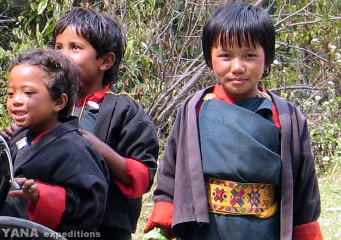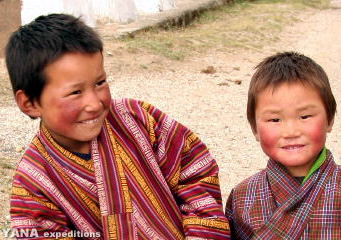 |
Bhutan Development |
|
 |
Bhutan Information |
|
|
 |
| World
Food Programme in Bhutan |
 |
|
Children learn to grow nutritious food at school |
 |
Karma Yangzom speaks shyly when she is with me but in the school garden she moves with ease and confidence among her peers. She is, after all, the captain of her school's Agriculture Programme.
"The vegetables here are organic and fresh, I can eat them confidently without worrying if there are any harmful chemicals," she says, indicating the extensive vegetable garden at the Lower Secondary School in Yurung, south-eastern Bhutan.
I nod encouragingly. It's amazing how aware this 15-year-old is of the importance of eating nutritious food. Somehow, I don't recall my younger self being this knowledgeable about organic food.
Classes on Agricultural Gardening became part of the school's curriculum in 2002, under a joint initiative by two ministries of the Royal Government of Bhutan: Agriculture and Education.
It's a boarding school and the students receive three meals a day. WFP provides the basic food for breakfast and lunch to the school, while the Government takes care of the dinner.
Vegetables grown through the agriculture programme supplement each of the three meals, ensuring tjhe students have a healthy, balanced diet.
"The SAP is important, not only because it provides our canteen with fresh vegetables, but also because the children learn about modern ways of farming. They learn to appreciate the value of producing nutritious food and they take this knowledge home to their parents," explains the school's Principal Ugyen Wangdi.
"I know what we plant and how we grow them. I learn a lot from how to make a bed and move plants from one plot to another to ensuring they have proper spacing," says Yangzom.
Nurturing The Community
The benefits of the programme do not just end with having nutritious school meals and raising farming-savvy students. "We are trying to stimulate the local market here and be less dependent on food imports from other countries," says Wang Norbu, Yurung LSS's Agriculture Teacher.
"We have a very unique way of doing the agriculture programme here because our garden is shared with the community - so they come here, including some of the parents of our students, to learn the proper ways of farming and to work. Then whatever they harvest from their share of the plot, they sell to us for the school canteen to use," Wangdi adds.
At the beginning of the year, the school invited members of the local cooperative group Sonam Dangonor Gongphel Tshogpa (literally translated as "Agriculture and Animal Development Group") to take advantage of the shared garden.
Tendi Zangmo, a giggly 66-year-old farmer, is one such interested member. She lingers with me and says, "I'm old and I have to keep up with the young ladies but I like working here. Farming tools are provided and it's really nice. I enjoy being with the group".
According to the accountant of the cooperative, Sangay Norbu, they have earned an additional BTN10,000 (approximately USD160) for their common savings account since they started working on the garden. That goes a long way in rural Bhutan.
A much younger member of the cooperative, 32-year-old Dechen Tshomo chimes in, "I come here not thinking about how this can help me, but how it can benefit my four young children".
Small Investment, Big Impact
In 2010, Yurung lower secondary school won the Best School Farm award and continues to be a model SAP school in Bhutan. In fact, its garden's facilities have grown with a grant support from Her Royal Highness Princess Maha Chakri Sirindhorn of the Kingdom of Thailand in 2012.
"The Royal Government of Bhutan will soon fully takeover the School Feeding Programme from WFP in 2018. Now is the best time for us to move towards self-sufficiency and produce food for ourselves…I believe the school agriculture programme is an essential part of this", says Wangdi.
"I want to be a doctor when I grow up. But if all else fails, at least I know I can be a good farmer and make a living out of it," Yangzom says with a sparkle in her eyes.
It's too early to tell what the future may hold for Karma, but for now, one thing is certain: tomorrow, she will wake up to the smell of her favourite breakfast - chickpeas and fried rice.
 |
| Source: World Food Programme WFP, October 2013 |
top
| Information on Bhutan |
 |
| Links |
 |
 |
 |
External
links |
|





